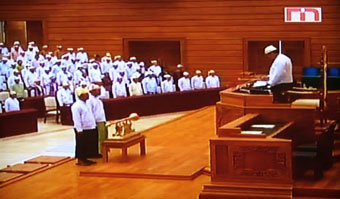Banning journalists from covering the news of Parliament sessions in Burma is undemocratic, the France-based Reporters sans Frontieres (RSF) said on Tuesday...
New Delhi (Mizzima) – Banning journalists from covering the news of Parliament sessions in Burma is undemocratic, the France-based Reporters sans Frontieres (RSF) said on Tuesday.
 The first session of Parliament in two decades was convened on Monday, but domestic journalists and foreign correspondents were barred from covering the news of the sessions.
The first session of Parliament in two decades was convened on Monday, but domestic journalists and foreign correspondents were barred from covering the news of the sessions.
‘The junta’s road to democracy is in fact undemocratic’, RSF editor-in-chief Gilles Lordet told Mizzima. ‘This is mere farce. They are doing it (convening Parliament) just to show the world that they are striving for change and no more military rule in Burma.
‘This is not the truth. The situation remains unchanged as before. There are no changes at all’.
Lordet also called for the release of imprisoned journalists, bloggers and other political prisoners.
The Committee for Professional Conduct (CPC), which was recently formed in Burma to develop private media, and the Rangoon-based Foreign Correspondents Club in Myanmar (FCCM), applied to the Press Scrutiny and Registration Division [censorship board] for permission to cover Parliament sessions, but they were informed that media would not be invited to cover the sessions.
“We received a reply from them saying not only the CPC, but no other news agencies were invited’, said CPC chairman Ko Ko.
After the Parliament session on Monday, reporters had to visit guesthouses and hotels where members of Parliament were staying to find out what happened in the historic first session.
The junta permits state-run media to cover the news of elected assemblies in states and regions.
The Burmese exiled government, the National Coalition Government of the Union of Burma (NCGUB), Information Minister, Dr. Tint Swe, said not allowing journalists to cover Parliament demonstrated the junta’s lack of belief in democracy.
“I think they have banned reporters and media from covering the news to conceal the facts that they do not want to be disclosed to the people. This will not be good for the people’, he said.
Tint Swe, who lives in New Delhi, said, ‘In India, the parliament sessions are telecast live to the entire country. Democracy is based on the people. It means the representatives of the people cannot do anything which is not known to the people’.
Veteran reporter Subhajit Roy of the English-language newspaper Indian Express told Mizzima that reporters in democratic countries are entitled to cover deliberations and debates between ruling parties and opposition parties in parliament sessions.
‘For instance, the news of how the opposition criticises the ruling party in Parliament on various issues, such as rising commodity prices, terror issues, internal security, is important. It’s important for the people because it brings out the position of the government’, he said. In addition, after a parliament session, the MPs and ministers usually answer questions from reporters, he said.
In section 52 of the recently enacted Parliament laws, only members of Parliament are allowed to enter Parliament without permission of the speaker. Unauthorised persons inside the premises during sessions could receive up to a one-year prison term or be fined 100,000 kyat (US$ 850) or both.
RSF said that in 2010 Burma was ranked 5th worst regime in the world in terms of media freedom out of a total of 178 countries.


